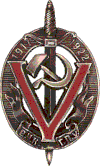Cheka
The Cheka [1] was the first Soviet state security organization. It was created on 20 December 1917, after a decree issued by Vladimir Lenin. Its first leader was Polish aristocrat-turned-communist Felix Dzerzhinsky.[2]
 Cheka badge as it was in 1922 | |
| Agency overview | |
|---|---|
| Formed | 1917 |
| Preceding agency |
|
| Dissolved | (reorganized and renamed) 1922 |
| Superseding agency |
|
| Type | Secret police |
| Headquarters | 2 Gorokhovaya street, Petrograd Lubyanka Square, Moscow |
| Agency executive | |
| Parent agency | Council of the People's Commissars |
History
By late 1918, hundreds of Cheka committees had been created in the cities. Many thousands of dissidents, deserters, or other people were arrested, tortured or executed by Cheka groups.[3] After 1922, Cheka groups underwent many reorganizations, as did the NKVD.
From its start, the Cheka was an important military and security arm of the Bolshevik communist government. In 1921 the troops of the Cheka numbered 200,000. These troops policed and ran the Gulag system; "requisitioned" food; tortured and executed political opponents; put down rebellions and riots by workers or peasants, and mutinies in the desertion-plagued Red Army.[4]
Cheka was succeeded by OGPU in 1922, but its members were still called Chekists.[5]
Name
The full name of the Cheka in 1918 was (in Russian) the "All-Russian Extraordinary Commission for Combating Counter-Revolution, Profiteering and Corruption".
A member of Cheka was called a "chekist" throughout the Soviet period, despite various official name changes.[6] The term is still found in use in Russia. For example, President Vladimir Putin has been referred to in the Russian media as a "chekist" due to his career in the KGB.[7]